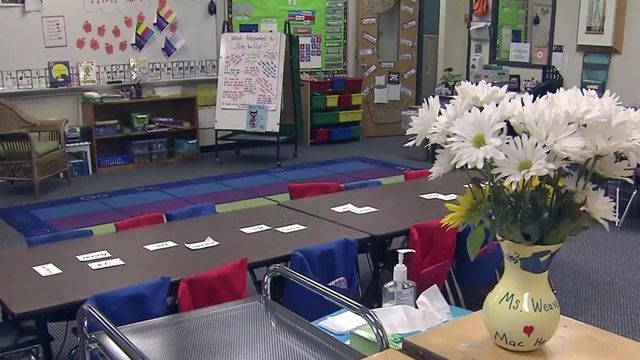Expansion of vouchers sparks debate
House and Senate GOP leaders are planning to expand the state's school voucher program again, but Democrats say the money should be spent on reducing class sizes in public schools instead.
Posted — UpdatedThe 2016-17 budget allotted $34.8 million for the vouchers, called Opportunity Scholarships. A proposal in both the House and the Senate budgets would add $10 million more in 2017-18, and another $10 million in 2018-19.
The increase follows legislation approved last year to drastically expand funding for the program over the next decade. About 5,800 students received vouchers this year. Some 8,300 will be served next year, and 10,700 vouchers will be available in 2018-19.
"It's simply supply and demand," said Rep. David Lewis, R-Harnett. "We are responding to parents who say, 'Hey, my kid's on the waiting list. I'd really like the opportunity to do this.'"
House Democrats say the expansion is neither necessary nor prudent.
In a budget subcommittee Thursday, Rep. Rosa Gill, D-Wake, tried to amend the provision to put the additional money into public school classrooms, saying it would help schools pay for a mandated reduction in K-3 class sizes.
Rep. Rick Elmore, R-Wilkes, one of the chief education budget-writers, said the fix to the class size mandate passed earlier this year had taken the immediate pressure off of local school districts, so the extra money wouldn't be needed.
"We have begun the process of investing in the Opportunity Scholarship program," added fellow budget-writer Rep. Hugh Blackwell, R-Burke. "There are waiting lists in general. We don't need to cut these funds back. We need to maintain this investment."
Gill asked committee staff whether all of the current funding had been used this year. The answer was that it had not.
The amendment was defeated on party lines. Speaking to reporters after the vote, Gill insisted the money isn't needed.
"What I could not understand is why they’re increasing that amount of the monies for scholarships when it’s already been determined that we have not filled all of the slots, and we still have a reserve," she said. "They could use it for the arts teachers or the special teachers if they needed to, especially in places where they had to cut."
Elizabeth McDuffie with the North Carolina State Education Assistance Authority, the organization that administers the voucher program, says both Blackwell and Gill are correct.
McDuffie explained that the program currently has a waiting list of more than 1,500 students. However, some funds for the 2016-17 school year were not spent because some parents accepted scholarships but did not use them. By the time the program was aware the slots were unused, it was too late to offer them to other students.
"We have changed our procedures to require families to provide the name of the school the student will attend by July 1, and we will work with the schools to identify who is not enrolled in order to offer unused scholarships to other students," McDuffie wrote in an email to WRAL News. "I fully expect we will fund 8,300 students in 2017-18."
Voucher opponents point out that funding for school enrollment increases is no longer automatic in the state budget, yet the scholarships are.
"This is about equity and accountability," said Katherine Joyce, who leads the North Carolina Association of School Administrators. "We need to level the playing field when it comes to accountability."
Unlike the Senate, the House budget would also require voucher students to take the Iowa Test of Basic Skills, a common national standardized test, to measure their academic progress. It also includes nearly $1 million over two years for the state to hire an independent research group to evaluate recipients' academic outcomes.
The statute that created the voucher program several years ago called for data samples and testing to make sure students were better off going to private schools, but that hasn't been funded.
Darrell Allison, president of Parents for Educational Freedom North Carolina, a group that supports vouchers, says he supports testing and the proposed evaluation.
"Just because we believe in having other options for families doesn't mean we push over to the side quality and accountability," Allison said. "You can't have your cake and eat it, too. If we're going to provide options, we have to have some reasonable measures in which we can assess and measure how is the program doing."
But Democrats say expanding the program before it's evaluated is irresponsible. Recent academic and governmental studies have shown that vouchers don't improve the academic scores of most children who receive them, and in Indiana, Louisiana and the District of Columbia, voucher students actually lost ground academically after moving into private schools.
"If you don’t evaluate a program, you don’t know how effective it is, and there has been no evaluation of the Opportunity Scholarship or the Special Needs Scholarship programs," Gill said. "But we just seem to be throwing money at Opportunity Scholarships."
Related Topics
• Credits
Copyright 2024 by Capitol Broadcasting Company. All rights reserved. This material may not be published, broadcast, rewritten or redistributed.






